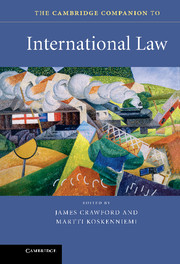Book contents
- Frontmatter
- Contents
- Preface
- Notes on contributors
- Introduction
- Part I The contexts of international law
- Part II International law and the state
- Part III Techniques and arenas
- Part IV Projects of international law
- 12 Constituting order
- 13 Legitimating the international rule of law
- 14 Human rights in disastrous times
- 15 Justifying justice
- 16 Regulating trade, investment and money
- 17 Divided against itself
- 18 Conserving the world’s resources?
- Guide to electronic sources of international law
- International law chronology
- Select guide to further reading
- Index
- References
17 - Divided against itself
Aspiration and reality of international law
from Part IV - Projects of international law
Published online by Cambridge University Press: 05 July 2015
- Frontmatter
- Contents
- Preface
- Notes on contributors
- Introduction
- Part I The contexts of international law
- Part II International law and the state
- Part III Techniques and arenas
- Part IV Projects of international law
- 12 Constituting order
- 13 Legitimating the international rule of law
- 14 Human rights in disastrous times
- 15 Justifying justice
- 16 Regulating trade, investment and money
- 17 Divided against itself
- 18 Conserving the world’s resources?
- Guide to electronic sources of international law
- International law chronology
- Select guide to further reading
- Index
- References
Summary
Introduction
Various human rights are widely recognised in codified and customary international law. These human rights promise all human beings protection against specific severe harms that might be inflicted on them domestically or by foreigners. Yet, international law also establishes and maintains institutional structures that greatly contribute to violations of these same human rights: central components of international law systematically obstruct the aspirations of poor populations for democratic self-government, civil rights, and minimal economic sufficiency. And central international organisations, like the World Trade Organisation (WTO), the International Monetary Fund (IMF) and the World Bank, are designed in ways that systematically contribute to the persistence of severe poverty.
We know, or certainly should know, that even today about a third of all human deaths – some 18 million annually – are due to poverty-related causes such as malnutrition, perinatal and maternal conditions, measles, diarrhoea, pneumonia, tuberculosis, or malaria (WHO 2008, 54–59, Table A1). Most of this annual death toll and the much larger poverty problem it epitomises are avoidable through minor modifications in supranational institutional arrangements that would entail only slight reductions in the incomes of the affluent. Such reforms have been blocked by the governments of the affluent countries that, advancing their own interests and those of their corporations and citizens, are designing and imposing a global institutional order that, continually and foreseeably, produces vast excesses of severe poverty and premature poverty-related deaths.
- Type
- Chapter
- Information
- The Cambridge Companion to International Law , pp. 373 - 397Publisher: Cambridge University PressPrint publication year: 2012
References
- 5
- Cited by



